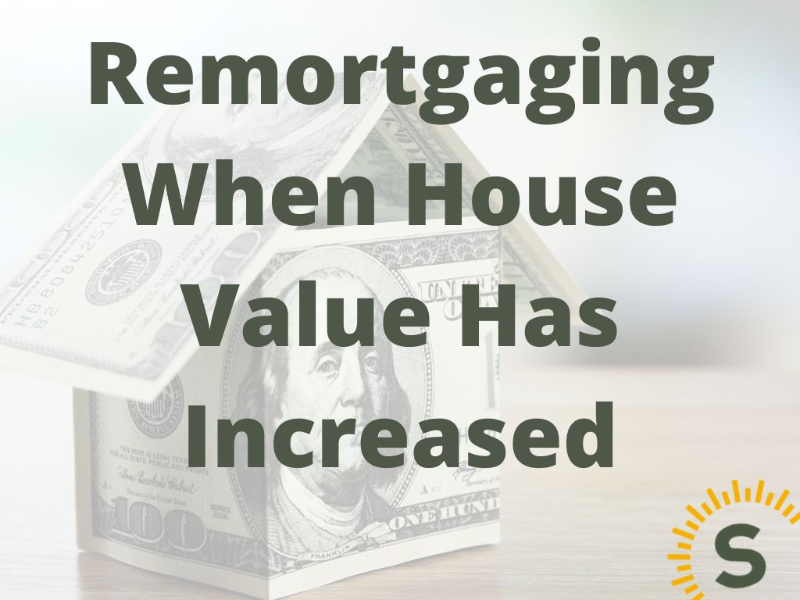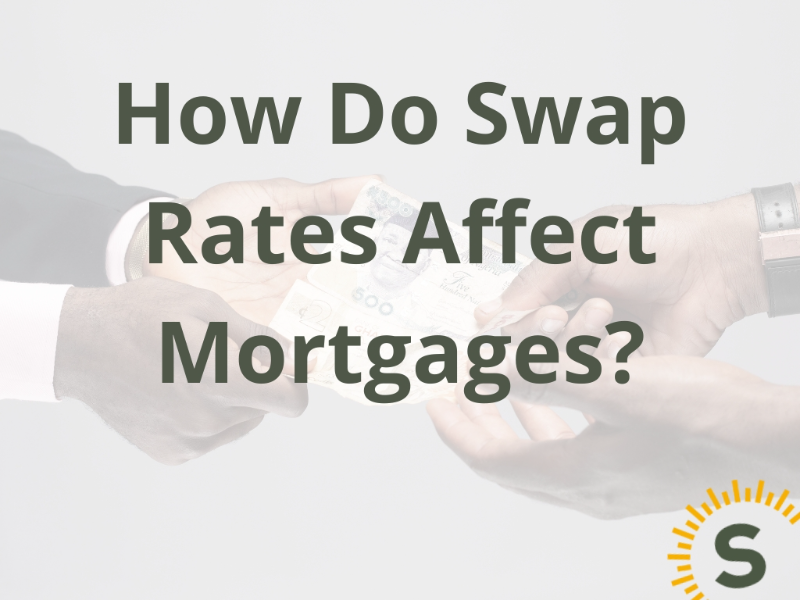
Property values can fluctuate in an unpredictable manner. However, when it's moving in your favour, you're going to want to take advantage. One way you can do that is by remortgaging when your house value has increased.
In this insight, we aim to provide information on why it's good to remortgage if your house value has increased.
Remortgaging when house value has increased can benefit you. It allows for greater mortgage options, lower interest rates, and the option to release equity for things like home improvements or debt consolidation. Consider how your loan-to-value has changed, compare deals, and seek mortgage advice for tailored recommendations.
Before we delve deeper, let's first address what equity is. In simple terms, equity is the percentage of your property that you genuinely possess. For instance, if your house is valued at £500,000 and you have a mortgage worth £400,000, your equity is £100,000. This equity can increase as you progressively repay your mortgage or if your property's value increases.
To calculate your equity, you need to know your property's current market value and the outstanding balance on your mortgage. Subtract the mortgage balance from the house value, and you have your equity.
It's simple. An increase in your house value means an increase in your equity. This increased equity can be a gateway to better mortgage deals or even additional funds.
When you take out a mortgage, the loan-to-value (LTV) ratio compares your loan amount to the property value. A lower LTV is preferred for better rates. For example, if your home value increases from £150,000 to £200,000, remortgaging for £120,000 would result in a 60% LTV, qualifying you for favourable deals. Alternatively, you can remortgage for a higher amount and receive cash.
There are several reasons why homeowners consider remortgaging when their house value has increased. Here are some common ones:
A significant increase in your property's value, especially in sought-after locations, can put you in a favourable position to negotiate lower mortgage rates. This step means reduced monthly repayments which can be a significant relief for many homeowners.
A rise in house value also presents an opportunity to remortgage to release equity. You can take out a new mortgage, cover the balance of your old mortgage, and withdraw the extra as cash. You could also take out a larger mortgage to release more cash, although this might come with higher interest rates.
For instance, let's say your home is valued at £300,000, and your current mortgage balance is £200,000. If you decide to remortgage for £250,000, you would pay off the existing mortgage and have £50,000 in cash. This would result in an LTV ratio of 83%, unlocking funds for various purposes.
Many lenders will only allow you to take a loan to value of up to 90% of your property. You will also need to pass the affordability checks to borrow the additional funds.
Before you consider remortgaging, it's crucial to accurately evaluate your property's current market value. You can use an online valuation tool for an estimate. However, for a more accurate valuation, consider engaging a professional estate agent or surveyor who understands the property market well.
Just because your house value has gone up does not mean you should always remortgage. Remortgaging early before your mortgage term ends can come with potential costs.
It's crucial to weigh the benefits against these costs. Costs may include early repayment or exit charges, especially when switching lenders. New mortgage arrangements may also come with fees like valuation and solicitor fees. However, the benefits of lower interest rates or extra cash might outweigh these costs.
A mortgage adviser will always be happy to talk through your scenario if you want to make sure you're in the best position you can be with the benefit of your house value increase.
When remortgaging, it's essential to explore all your options. While staying with your current lender might seem the easiest route, they might not offer the best deal. Consider comparing remortgage deals online or using a mortgage broker to get a realistic view of potential savings or how much money you could release through remortgaging.
The remortgaging process can be complex, and some lenders may reject your application if you do not meet their criteria. Engaging a mortgage adviser can offer you many benefits. They can access exclusive remortgage deals, save you time by researching the mortgage market on your behalf, and offer expert advice to meet your remortgaging needs.
When determining the value of your house for remortgaging purposes, there are several options you can consider:
Use reputable online valuation tools that provide estimates based on data such as recent sale prices of similar properties in your area. Keep in mind that these are estimates and may not reflect the exact value of your house.
Explore property listing websites to find similar properties in your area that are currently for sale or have recently sold. This can give you an idea of the price range in your locality.
Reach out to local or an online estate agents who have expertise in your area. They can provide a professional valuation based on their knowledge of the market and recent property sales.
Reach out to your mortgage lender directly to ask if they offer valuation services or can provide guidance on how to determine the value of your house for remortgaging purposes. They may have specific requirements or preferred methods for valuation.
Remember, the value of your house can fluctuate based on market conditions, so it's important to regularly reassess its value when considering remortgaging. Additionally, keep in mind that the final valuation for remortgaging will be determined by your chosen lender, who may have their own valuation process.
Remortgaging your home usually takes around 4 weeks, but the timeframe can vary. If you switch to a new lender, they'll assess your affordability, check your credit, and value your home. The possible bottleneck in completing sooner comes with the issue of conveyancing. If you remortgage to a new lender, a new set of legal work will need to be completed and this can take time. Many lenders cover the cost of the legal work or offer an incentive to help contribute to it. For more information on remortgaging and the legal work involved, read our insight: Do I need a Solicitor to Remortgage?
Alternatively, you can opt to stay with your lender and arrange a product transfer, alongside a further advance. This just means, you pick a new deal and borrow some additional funds at the same time. Without further borrowing, a product transfer could be processed online in a day.
Remortgaging when house value has increased can offer a multitude of benefits. Whether you're looking to secure lower mortgage rates, raise some capital, or simply reassess your financial situation, it's a strategy worth considering. Remember to do your due diligence, consult experts where necessary, and ultimately make a decision that benefits your financial future. If you're unsure where to get started, complete the Sunny Fact Find for Mortgage advice.

Stuart is an expert in Property, Money, Banking & Finance, having worked in retail and investment banking for 10+ years before founding Sunny Avenue. Stuart has spent his career studying finance. He holds qualifications in financial studies, mortgage advice & practice, banking operations, dealing & financial markets, derivatives, securities & investments.
 No minimum
No minimum  Newcastle-under-Lyme, Staffordshire
Newcastle-under-Lyme, Staffordshire Free Consultations
Free Consultations
 No minimum
No minimum  Free Consultations
Free Consultations
 No minimum
No minimum  No obligation consultation
No obligation consultation
 No minimum
No minimum  No obligation consultation
No obligation consultation
 No minimum
No minimum  Free Consultations
Free Consultations
 No minimum
No minimum  No obligation consultation
No obligation consultation
 No minimum
No minimum  No obligation consultation
No obligation consultation
 No minimum
No minimum  Free Consultations
Free Consultations
 No minimum
No minimum  Coatbridge, Lanarkshire
Coatbridge, Lanarkshire Initial or Ongoing Consultation Fees
Initial or Ongoing Consultation Fees
 No minimum
No minimum  Initial or Ongoing Consultation Fees
Initial or Ongoing Consultation Fees
 £21,000 +
£21,000 +  Initial fee free consultation
Initial fee free consultation
 London, Greater London
London, Greater London No obligation consultation
No obligation consultation
 No minimum
No minimum  No obligation consultation
No obligation consultation
 No minimum
No minimum  Initial fee free consultation
Initial fee free consultation
 No minimum
No minimum  No obligation consultation
No obligation consultation
 No minimum
No minimum  No obligation consultation
No obligation consultation
 No minimum
No minimum  Initial fee free consultation
Initial fee free consultation
 No minimum
No minimum  Initial or Ongoing Consultation Fees
Initial or Ongoing Consultation Fees
 £51,000+
£51,000+  Free Consultations
Free Consultations
 No minimum
No minimum  No obligation consultation
No obligation consultation
 No minimum
No minimum  Initial fee free consultation
Initial fee free consultation
 £101,000+
£101,000+  Bishop's Stortford, Hertfordshire
Bishop's Stortford, Hertfordshire No obligation consultation
No obligation consultation
 No minimum
No minimum  Derry / Londonderry, County Derry / Londonderry
Derry / Londonderry, County Derry / Londonderry Free Consultations
Free Consultations
 No minimum
No minimum  Stockton-on-Tees, County Durham
Stockton-on-Tees, County Durham Free Consultations
Free Consultations
 No minimum
No minimum  Initial fee free consultation
Initial fee free consultation





Our website offers information about financial products such as investing, savings, equity release, mortgages, and insurance. None of the information on Sunny Avenue constitutes personal advice. Sunny Avenue does not offer any of these services directly and we only act as a directory service to connect you to the experts. If you require further information to proceed you will need to request advice, for example from the financial advisers listed. If you decide to invest, read the important investment notes provided first, decide how to proceed on your own basis, and remember that investments can go up and down in value, so you could get back less than you put in.
Think carefully before securing debts against your home. A mortgage is a loan secured on your home, which you could lose if you do not keep up your mortgage payments. Check that any mortgage will meet your needs if you want to move or sell your home or you want your family to inherit it. If you are in any doubt, seek independent advice.